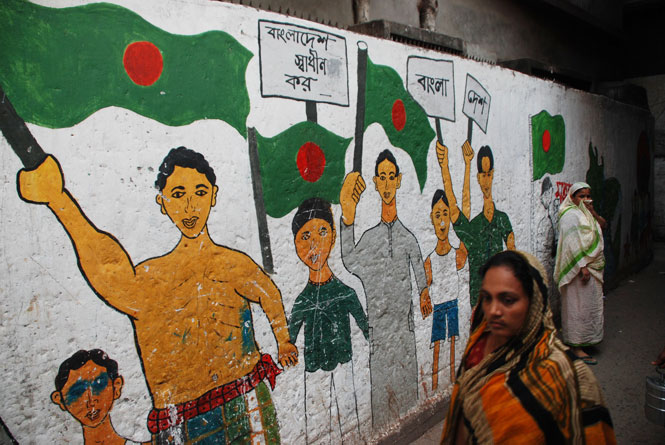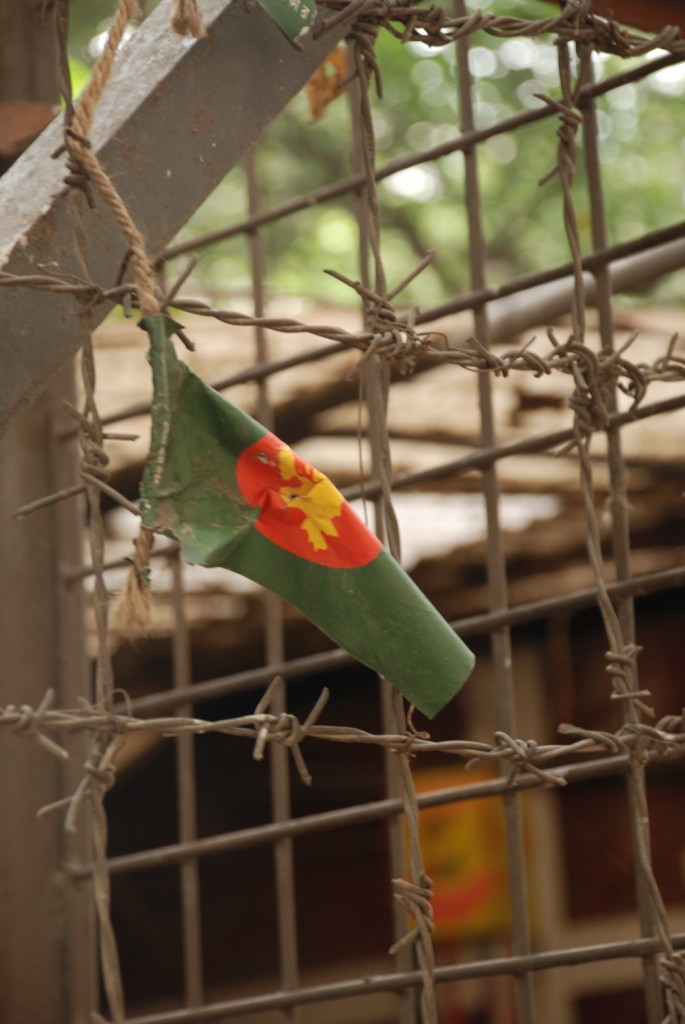Is a war crimes tribunal being used to settle political scores? If so, it may unleash social chaos, reports Sebastian Strangio.
DHAKA – BANGLADESH’S Liberation War Museum sits on a quiet street in central Dhaka, shaded by trees and fronted by an austere barbed wire fence. The small building commemorates the country’s 1971 liberation struggle, a fierce war of independence from Pakistan that cost an estimated 3 million lives. An eternal flame in the museum’s courtyard marks it out as a site of martyrdom—a reminder of the bloody star under which the country was born. Almost fittingly, dozens of small Bangladeshi flags are intertwined on the rusting barbs of the museum’s front fence.
Last week, Bangladesh’s government arrested two leading politicians from the country’s main Islamist party, Jamaat-e-Islami, on charges of committing mass murder during the liberation struggle. The arrests, which followed the detention of the party’s president, Motiur Rahman Nizami, and other top Jamaat officials in late June, mark the first stage of a tribunal established in March to address war crimes committed during the 1971 conflict.

- A nationalist mural in Motijheel, the commercial heart of Dhaka. (Photo: Sebastian Strangio)
But even though the tribunal has no scheduled start date, it has already whipped up controversy in Muslim-majority Bangladesh. The government of Prime Minister Sheikh Hasina, which was elected in a landslide in 2008 in part on promises of a trial, says it has evidence proving the involvement of senior Jamaat members in the 1971 atrocities. Critics, however, say the tribunal is being used to settle domestic political disputes and runs the risk of unleashing social chaos and compromising Dhaka’s relationship with Muslim allies in the Middle East.
The tribunal comes after nearly four decades of inaction in Bangladesh. The 1971 conflagration, which erupted when Pakistan attempted to prevent the secession of its eastern wing, included the systematic execution of leading Bengali intellectuals and the rape of by some estimates 200,000 women. Although the process of putting collaborators on trial began after the defeat of the Pakistani army on December 16, 1971, the tribunal process was derailed after the assassination of independence icon Sheik Mujibur Rahman in August 1975. Ahmed Ziauddin, an advisor to Bangladeshi rights group Odhikar, says that for the following three decades, a succession of military administrations has swept aside all attempts at justice, fearing it could implicate many within their own ranks.
‘The current process is, if you like, unfinished business that started in 1972,’ he says.
Mahbub Alam, general manager of the Liberation War Museum, says that even though 40 years have passed and many perpetrators are long dead, there’s a widespread desire to see responsible politicians brought to justice. ‘The people who did all these kinds of misdeeds are the beneficiaries of the creation of Bangladesh,’ says Alam, who lost his father in the Liberation War. ‘Why are war criminals in power? They are the beneficiaries of the country, of three million martyrs.’
Given the political difficulties involved in trying to extradite former military officers still living in Pakistan, the government is instead focusing on the razakars—internal collaborators who led, assisted and committed crimes in conjunction with the Pakistani administration then in control of the country. For the moment, the attention is falling squarely on Jamaat and its allies.
Critics, however, say the tribunal could be compromised by its blatant use as a political bludgeon. Don Beachler, an associate professor of political science at New York’s Ithaca College, says the government has set up the tribunal in order to tar Jamaat-e-Islami as allies of the Pakistani army and ‘enemies of the Bangladeshi people.’ The fact that Jamaat ruled in coalition with the Bangladeshi Nationalist Party—a key rival to the Awami League—from 2001 to 2006 provides an ‘extra motive’ to pursue the Islamist movement, he says.
Many also agree that Nizami and other Jamaat leaders have reason to be concerned. Beachler says Nizami founded and led the Badr militia, which committed numerous acts of violence against civilians in support of the Pakistani army’s campaign to repress Bengali nationalism. ‘Nizami was active against independence and advocated violence against Hindus who were seen as the source of Bangladeshis’ alleged betrayal of Pakistan and Islam,’ he says. ‘On the merits and the politics Nizami has much to fear.’
Following their arrest, Jamaat’s leaders have pledged to fight the charges in court, accompanying it with ‘peaceful’ street protests. Earlier this month, Khaleda Zia, the BNP president whose party ruled the country in coalition from Jamaat from 2001 to 2006, demanded the immediate release of its leaders, terming the arrests ‘a heinous example of political repression’.

- The Liberation War Museum in Dhaka. (Photo: Sebastian Strangio)
Jamaat, which has close links to its more powerful namesake in Pakistan, has more than ten million followers, and any attempt to prosecute its leaders could provoke a social upheaval. After Nizami’s arrest on June 29, for example, violent street riots erupted and injured more than 80 people—a foretaste of what could greet the opening of the trials.
‘The Bangladesh government can expect major violence and/or law and order problems at home, with serious destabilising effects caused by militant members of Jamaat and its allied organisations,’ says Rafiqul Islam, a professor of international law at Macquarie University in Sydney, adding that militant help may also come from Pakistan and Afghanistan. ‘This is a price that the government and people of Bangladesh have to pay for this trial.’
There are also questions about the manner in which the trials are going ahead. Nizami—along with his deputy Ali Ahsan Mohammad Mujahid and top preacher Delwar Hossain Saydee—were arrested on charges of ‘offending religious sentiment’ after they compared their persecution by the Awami League government to the sufferings of the Prophet Mohammed. Only once they were in custody did the government move ahead with questioning on war crimes-related charges.
In an editorial in the country’s Daily Star newspaper on July 14, human rights advocate Mozammel H. Khan wrote that their arrest on such ‘trivial charges’ could undermine the credibility of the government’s case against them. ‘It might create a boomerang effect,’ he wrote, ‘for the government in their pledge to bring the alleged war criminals, of which the three arrestees are believed to be leading members, to book.’
Islam predicted that while the current government would reap political capital from the trials, they could damage relations with Middle Eastern countries with close links to Jamaat. On July 2, The Daily Star reported that the tribunal had proceeded ‘on assurance from influential countries in the West that they would tackle any backlash from Middle East countries against the arrests of Jamaat leaders.’
In spite of the political machinations surrounding the trials, Alam expresses hope that they will at least see some manner of justice done. ‘In this country, if you go into each and every village you will find war victims,’ he says. He says that for most Bangladeshis, the desire for vengeance is less important than the desire to see justice done: ‘I don’t expect that these gentlemen should be hanged, but the gentlemen should be tried,’ he says. ‘I’d like to see it in my lifetime.’
[Published in The Diplomat, July 22, 2010]



